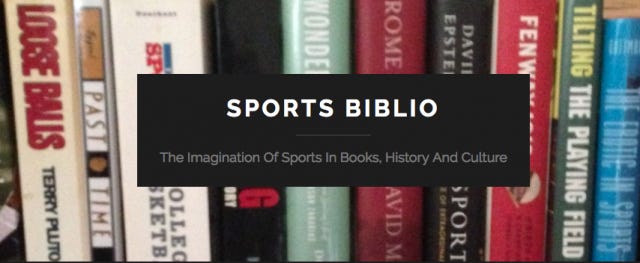Sports Biblio Digest, 7.28.19: Happy Indulgences in Obscurity

News, Views and Reviews About Sports Books, History and Culture
Also In This Issue: The Joys of Calisthenics; Sandy Koufax; Jack Nicklaus; ‘Baseball As Art’ Exhibit; Competitive Advantages; Dan Le Batard; The Great Romantic of Cricket Writing; The Indigenous Roots of Aussie Rules; Home Run Surge; A Forthcoming August Recess
* * * * * * * *
Maybe I’m just getting old, but I’m falling more deeply in love with the odd and obscure, with passions few others seem to care about, than ever.
I’ve always had an affinity for oddballs and lost causes, for obsessions of one. It’s still a hot summer around here, and this is affecting my current mood, as well as my very slow pace to getting things done.
(My apologies for getting out this newsletter later than I like, but my brain, as well as my body, are not exactly full-tilt right now, as I further explain in the final item.)
I’m learning to let go of always-on habits. After decades in the news business, this is very hard. Being an online publisher is very satisfying in spite of the stress, but there are times when I have to indulge in something slow and far away from the reach of the digital and social media mobs.
I’ve written about Victory Journal before and checked in recently after a long absence. This excellent piece by Joshua Neuman in the newest edition about former Rams owner Georgia Frontiere was featured in the Sunday Long Read, and it made me delve back into what’s available online.
There are more treats to savor, about sports artists Raymond Pettibon and Cleon Peterson, street racing in Detroit and the Argentinian soccer hotbed of San Cristobal.
This just isn’t off the beaten path, it’s well-nurtured and crafted words and photography. This is quite the tonic for what’s been bothering me about how our media worlds seem to be collapsing.
Slow media is no different from the slow cooking movement. It's not cheap, and it takes patience to redirect ourselves back to old habits. While we crave instantaneous pleasures, at some point we’ve come to realize how easy it is to become wholly consumed by them.
However, like most everything but books these days, I read online, and revisiting Victory Journal (as well as Glory, a U.K.-based publication about football, travel and culture) has given me reason to rethink this.
I don’t subscribe to newspapers or magazines except in their digital form, and as this is turning out, it’s not a panacea. My frustration with The Wall Street Journal app in finding stories to its Weekend Review section prompted me to do something I rarely do: Write a letter to customer support. I cannot find these pieces anywhere, and it’s almost as maddening as not being able to find the paper in any local stores.
What’s drawing me to Victory Journal again (and Glory, which devoted a whole issue to football in Kosovo!) is that it’s stuck to its initial pledge of pulling away from presentism and the mania over statistics to remind us what human beings of all kinds do to run away from the herd and find some meaning and distinctiveness in their lives.
A Few Good Reads
Aussie Rules historians got a jolt in June when the Australian Football League changed some long-held stances on the roots of the sport to include indigenous games. While acknowledging that Aboriginal people played various forms of Australian football, including a game called Marngrook, some have called the AFL’s new statement “an attempt to rewrite history” and “an evidence gap;”

At The Athletic, Dale Murphy says not to despair if you’re among those weary of the home run pyrotechnics (and alarming strikeout numbers to go with them) this season: A more creative hitting revolution is coming, embodied by White Sox prospect Nick Madrigal, who’s 5-foot-7 and 165 pounds, and who’s got more than just all the right numbers. He could provide the counter to the prevailing demands;
Shelby, N.C., located not far from Charlotte, has become the home for the American Legion youth baseball tournament. This summer, the Cleveland County Arts Council has opened a “Baseball at Art” exhibit that includes paintings of Satchel Paige, Lou Gehrig, Mickey Mantle, more contemporary stars and a silkscreen mural of some of the game’s greats;
More than 50 years after his retirement, Sandy Koufax is getting a statue at Dodger Stadium. It’s part of a newly redesigned outfield plaza due to open next year and will be placed next to a relocated Jackie Robinson statue;
Outdoor calisthenics is a burgeoning movement among everyday athletes in New York City, where leagues and competitions are forming and growing in such places at Central Park and Prospect Park in Brooklyn. Says one devotee of his fellow pull-up competitors: “These people are special. They’re not special because they were born with certain gifts. They’re special because they believe that if they continue to do certain things, they’ll be better;"
Some residents of a posh Florida residential community and golf club designed by Jack Nicklaus are pushing back at what they say is fear and intimidation from the Golden Bear himself. Three residents of the Bear’s Claw have filed suit against Nicklaus, claiming heavy-handed dealings with the homeowners’ association and trampling the rights of homeowners upset with how the community is being run;
At The New Yorker, Louisa Thomas writes about ESPN host Dan Le Batard’s refusal to heed company policy about commenting on politics. For what it’s worth, I agree with Le Batard’s views of an American president who’s hostile to immigrants. But Thomas is typical of so many mainstream journalists in declaring that “many people feel like what he did is what we should be doing: turning off the baseball game and focussing on what feels urgently important.” Except that there are cable news channels and numerous other outlets where these daily outrages are spewed endlessly. ESPN went too far with politics and “social justice” and failed. It’s veering back to the “urgently important” need to partake in daily life, including sports. Politics is always downstream of this, and is hard to understand only in the elite media ranks where the mad ramblings of one man are all-consuming;

Sports Book News
Much praise and some criticism is being heaped on Duncan Hamilton’s new book, “The Great Romantic: Cricket and the Golden Age of Neville Cardus,” published this past week by Hodder & Stoughton. It’s a biography of the renowned cricket writer for the Manchester Guardian whose prose elevated coverage of the sport for the masses in the years after World War I.
Cardus, who lived from 1898-1975, grew up in poverty and didn’t have an elite education nor any formal music training. But he became one of the most acclaimed journalists in Britain and Australia in a glittering career that also included being a famous music critic.
He lived in Australia and wrote for The Herald in Melbourne and The Sydney Morning Herald from 1940-47, then bounded between Australia and England for several years before settling in London.
It is Cardus’ early years in a grimy neighborhood in Manchester without a father that “are a biographer’s gift,” giving Hamilton the rich materials to detail the tale of a Dickensian boyhood that has an atypical happy ending:
“Then the breakdown in the spring of 1919, the inspired decision at the start of that summer’s cricket season to give him some fresh air by sending him to Old Trafford to report on Lancashire’s first peacetime match.”
David Knayston writes that Cardus’ innovative work has stood the test of time, and notes that Hamilton addresses accusations of fabrications that Cardus at times did admit to doing.
At ESPNcricinfo, David Hopps writes that Hamilton is “predictably forgiving” and that Cardus got away with his inaccuracies because “he was engaged in a search for a Greater Truth, and by assigning himself such a noble task, set in motion a chain of literary sportswriting that survives, albeit in many different forms, to this day.”
To say Hopps is a bit sour is putting it mildly. He writes that Hamilton examines Cardus’ private life further than previous biographers, but concludes it’s beside the point because Cardus “invented himself as much as he did the players he wrote about.”
Here’s an excerpt published in The Guardian, with Hamilton giving a big nod to John Arlott, the noted cricket writer and commentator in post-World War II Britain, who understood the impact of Cardus' work:
“He became the first newspaperman to look at a cricket match as a reviewer, wonderfully expressive, rather than a reporter, sent to mechanically tell you how the scoreboard ticked over. The game’s aesthetics, rather than its statistics, motivated him.”
The BBC has produced a five-part audio tribute to Cardus in anticipation of the new book, with this summation by Toby Jones:
“He established cricket as the poet’s game and was the patron saint of the Manchester Guardian’s circulation department.”
At the U.S. Sport History blog, Bob D’Angelo reviews “Corked: Tales of Advantages in Competitive Sports,” published in April by Fifth Avenue Press. What humans do to win in anything has always been the subject of immense fascination, but D’Angelo points out that “Corked,” written by University of Michigan biomedical engineering and anesthesiology professors, isn’t about cheating as much as it shows “how factors besides a player’s talent can affect a team’s performance.”
More on the authors, Michael Burns and Brian Love here; and Love expands here on the baseball season’s hottest topic, as noted above, the surge in home runs.
See You In September
I’m stepping away from this newsletter for most of August, publishing every other week until after the Labor Day holiday in the United States.
The Digest will come to your inbox on Aug. 11 and Aug. 25. I need to recharge and enjoy what’s left of the summer. Making a concerted effort to get outdoors and away from the noise and busyness of a metro area has done wonders for my sense of well-being, and I’m not the kind of person to gush about these things.
A few hours on Sundays at a nearby state park (see photo below) and places like it replenish the body, mind and soul in ways I haven’t felt since I was a young girl. I’m not exaggerating; the natural wonders of our surroundings are vastly underrated, and I’ve ignored them too long. It's another middle age revelation that's come after having an ailing back for the last month and that I hope isn't too late to heed.
I’ve also got plenty of books that I will be featuring here starting in early September, including Roger Angell, Gerald Early, Aussie Rules sportswriting in the 1980s and a fall sports book preview. Slow reading, as noted in this week’s lead item, has many, many rewards, and I want to take some time preparing for an autumn schedule that I think will be very good.
I appreciate your readership and your patience. Please feel free to stay in touch with links and book recommendations and Happy Reading!

* * * * * * * *
The Sports Biblio Digest is an e-mail newsletter delivered every other Sunday. You can subscribe here and search the archives.
This is Digest issue No. 175, published July 28, 2019.
I’d love to hear what you think about the Digest, and Sports Biblio. Send feedback, suggestions, book recommendations, review copies, newsletter items and interview requests to Wendy Parker at sportsbiblio@gmail.com.


